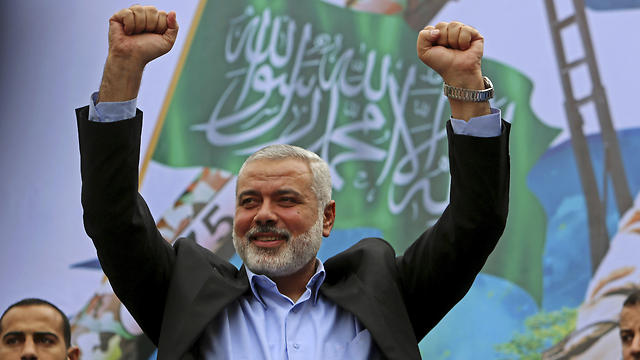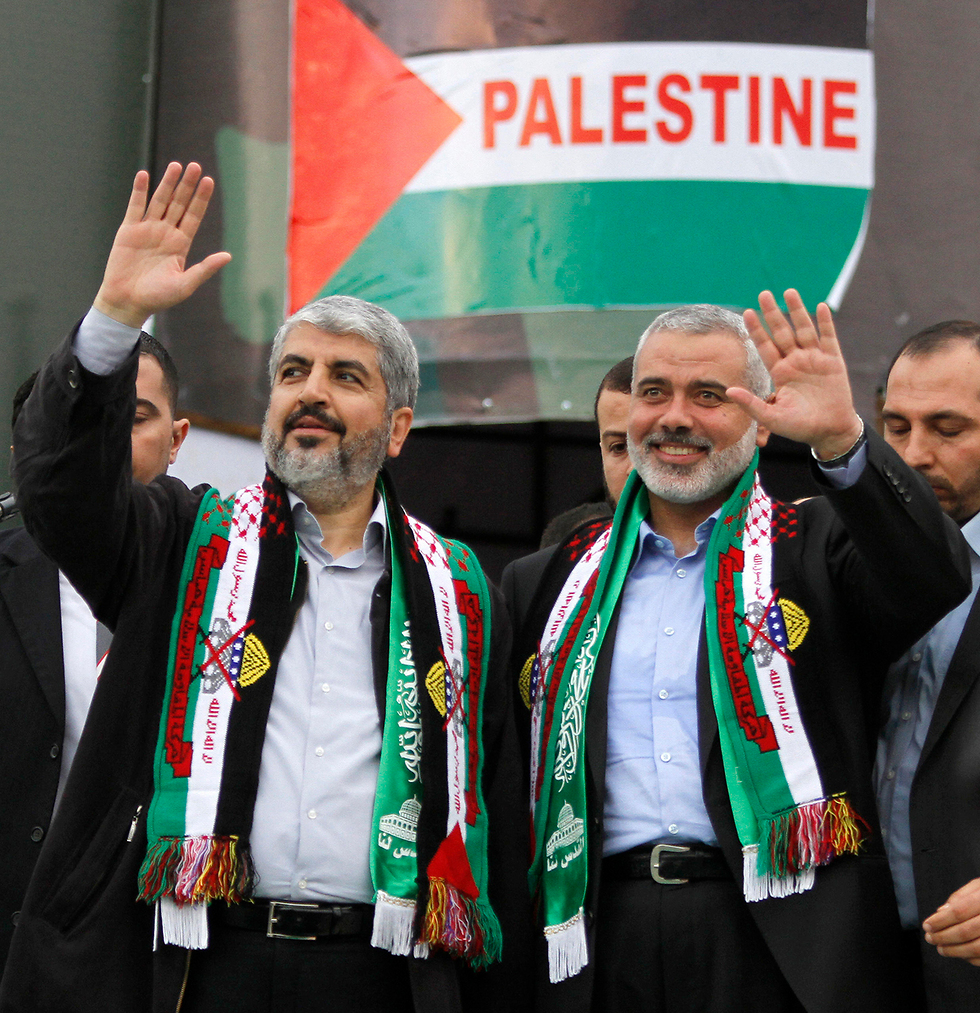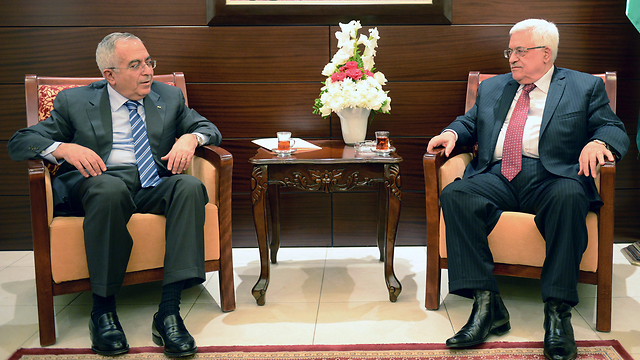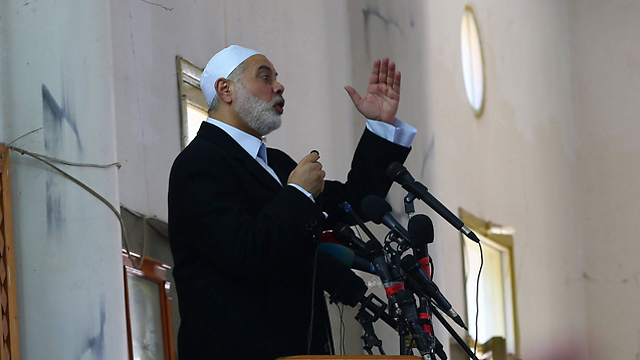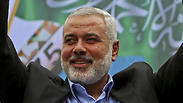

Meet the old-new head of Hamas: 'Not suicide bombings, but martyrdom operations'
He declared victory after every conflict with Israel, no matter the result, was dismissed by PA President Mahmoud Abbas for his involvement in the bloody Fatah–Hamas conflict, and claims that the spilling of blood in the fight against Israel is holy and righteous; meet Ismail Haniyeh—the new leader of Hamas in Gaza.
For years, Ismail Haniyeh led Hamas in Gaza, but starting Saturday—he will lead the entire organization.
Haniyeh succeeds Hamas' longtime exiled leader Khaled Mashaal, who acted as the head of Hamas for the last 21 years.
Over the last few years, Haniyeh confronted Palestinian Authority (PA) President Mahmoud Abbas on several different occasions, encouraged acts of terrorism even in times of ceasefire and announced victory after every battle against Israel.
Haniyeh, 52, also known as Abu al-Abed, was born in 1963 to a family of refugees in Al-Shati Camp near Gaza beach, where he lives to this day. In 1987, he graduated from the Islamic University of Gaza with a degree in Arabic literature.
This is where his political career began, joining Hamas while he was still a university student. From 1985 to 1986, he was head of the student council representing the Muslim Brotherhood—a movement which slowly became the ideological patron of Hamas.
Arrested three times by Israel in the late eighties, he became one of more than 400 expelled to southern Lebanon in December 1992. By then, he was already one of the leaders of Hamas' new generation, known for his charisma and excellent rhetoric skills.
After Israel was forced to release Hamas leader Ahmed Yassin from prison in 1997 following a failed assassination attempt on Khaled Mashaal in Jordan, Haniyeh was appointed to head his office.
Due to his relationship with Yassin, Haniyeh's prominence within Hamas grew and he was appointed as representative to the Palestinian Authority.
Following a suicide bombing in Jerusalem in 2003, his hand was lightly injured during an IAF attack attempting to eliminate Hamas leadership.
In December 2006, Haniyeh was elected to head the Hamas list, which won the Legislative Council elections the following month. As a result, Haniyeh was sworn in as the PA prime minister, but on June 2007, Abbas dismissed Haniyeh and appointed Salam Fayyad in his place after Hamas orchestrated a coup in Gaza.
The appointment of Fayyad to replace Haniyeh has been challenged as illegal because under Palestinian law, the president of the Palestinian Authority may dismiss a sitting prime minister, but may not appoint a replacement without the approval of the Palestinian Legislative Council.
According to the law, until a new prime minister is thus appointed, the outgoing prime minister heads a caretaker government.
Fayyad's appointment was never approved by the Legislative Council. For this reason, Haniyeh has continued to operate in Gaza, serving as leader of Hamas in Gaza and deputy to Khaled Mashaal, recognized by a large number of Palestinians as the legitimate acting prime minister.
Anis al-Qasem, the Palestinian constitutional lawyer who drafted the Basic Law, is among those who publicly declared the appointment of Fayyad to be illegal.
In 2009, Haniyeh congratulated Barack Obama on his victory in the US presidency elections, saying that victory was a "triumph of equality over discrimination."
He then called on Obama to support the Palestinians' right to freedom, saying, "We are on our way to liberation, like the people of South Africa and America. We can't be satisfied living under a terroristic and barbaric occupation."
A year later, Haniyeh named his grandson Erdoğan after Turkey's president, who remains in power to this day. He did so after the Turkish president expressed his support for the Palestinian people and objection to Israel.
In 2012, in commemoration of the third anniversary of Operation Cast Lead, Haniyeh gave an interview to British online newspaper The Independent, claiming that the Gaza blockade enacted in September 2007—after Hamas won the brief but brutal civil war against Fatah—was "the biggest crime that modern history ever witnessed."
"We want to live like the rest of the world. To have rights. To have a state," Haniyeh insisted.
Then, when asked about Hamas' use of suicide bombers, Haniyeh said that they were not "suicide operations," but "martyrdom operations," claiming, "We only did this because there's bloodshed committed by the Israelis. It is a reaction to F16s bombarding people, killing men, women and children. They continued targeting Palestinian civilians, and that's what pushed the Islamic fighters to carry out this kind of operation."
He even claimed that Hamas is not a terror organization, saying, "The Europeans and Americans have said the martyrdom operations are why Hamas has been put on the terrorist list. But now these operations have stopped. Did they then remove Hamas from the list of terrorist organizations?
"We do not launch wars. We are people resisting occupation."
Forever the populist, that same year—just one day after Operation Pillar of Defense—Haniyeh said, "Victory is a fact. The Middle East has changed." Two years later, after the end of Operation Protective Edge, Haniyeh made similar claims, saying, "We amazed the world; we surprised Israel."
After coming out of his 50-day stay in an underground bunker, Haniyeh stated that "those whose blood was spilled and the martyrs were the fuel of this victory. It's is a victory twice the size of the one in Operation Pillar of Defense."
The new leader of Hamas has made ties with the other factions in Gaza, including Islamic Jihad. He is a welcomed figure in Qatar (the main donor for the rehabilitation of Gaza), Turkey (whom he supported and even visited after the Gaza flotilla raid) and is even highly regarded in Iran.
But, there may be hope after all. Despite his venomous rhetoric against Israel and the fact that he served as the leader of a group responsible for many terrorist attacks against Israeli citizens, Haniyeh was not deterred from seeking aid in Israel, admitting two of his daughters to an Israeli hospital in 2013 and 2014 when they needed medical treatment.
(Translated & edited by Lior Mor)














